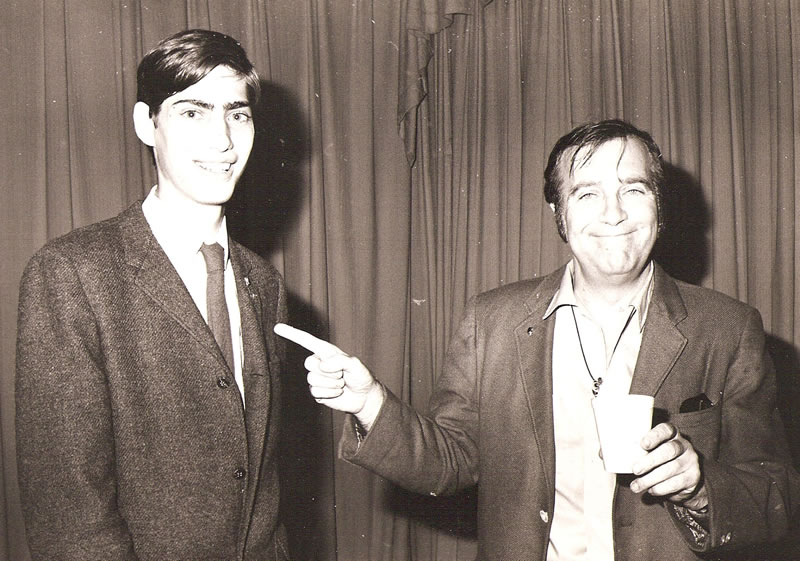Excelsior, you fathead
Throughout the years, I have endured several nervous turns as a concert producer, but none scarier than my first attempt acting the impresario. I had spoken with Jean Shepherd before his WOR New York radio program one night about a possible fund raising concert, then stayed to listen to him render a smooth, brilliant monologue about steel mills and prom nights in Hammond, Indiana. I knew Jean’s friend Leigh Brown from my hometown of Clifton, New Jersey. She ushered me into a small studio at 1440 Broadway in Manhattan, giving me introductions to Jean and other radio idols Bob (Elliott) and Ray (Goulding). Like my compadre baby boomers, I was raised on Captain Video, Howdy Doody, and The Lone Ranger. Although radio’s death knell was supposedly sounded in my childhood, with the advent of the cathode ray tube, radio was far more compelling for me and for a legion of dedicated listeners. Nothing we knew compared to Shep’s storytelling. It was human communication at its freaking best. For most of my adolescence, I’d stay up (too) late on school nights, sit in a dark room and listen to his familiar voice. Each session was an intimate visit from an old and admired friend I never met. Perhaps these were learning sessions. I was overwhelmed with the genius of a writer so at home with plot, language, irony, rhythm, humor, words, life and emotions, a writer who could create allegorical works of art, night after night, as deftly as a Dutch diamond cutter might incise facets on a million dollar gemstone. Jean Shepherd worked the English language as if it were a jewel, which of course…it is. The deal was struck. One thousand dollars (in September, 1969 money!) would be paid up front, and another grand handed over the night of the performance. A piece of cake, I thought. Jean Shepherd had been on the air for years in New York and Philadelphia. He wrote for Playboy and penned a hit book of short stories, In God We Trust, All Others Pay Cash. His name was a household word among the metropolitan area intelligentsia who made him a cult hero and attended his live one-man shows at the Limelight. You may know Jean Shepherd as the creator of “A Christmas Story,” the movie with the Red Ryder BB gun, a snotty department store Santa, and a wealth of nostalgic Americana.
By the day of the concert, 23 tickets were sold. This would certainly make the 1,000-seat hall appear under-attended. I was concerned. What would Shep think? Here I was being so cool and hanging out with him and all. The gala was looking more and more like a funeral. But, Jean announced the event on the radio, and sure enough, opening night, the line outside the box office stretched to the horizon. All seats were sold in a frenzy that left some enthusiasts begging for admission. It was like one of Jean Shepherd’s stories. I was off the hook, and I learned a few things about life and art. Shep knew, and prodded me afterwards, “So, Kid, how was your first taste of the big time? Sweaty, right?” Then he chuckled. I went to see Jean Shepherd one last time at his annual Princeton University concert a few years ago. He was ailing, but game. He still had it. I heard that Leigh passed away, and soon followed the news that Jean was gone on October 16, 1999. Recently, Debbie Adler from KCRW radio, 89.9 FM in Los Angeles sent me a two-disk memorial her station had aired, A Voice in the Night: A Tribute to Jean Shepherd. It was produced for public radio by Harry Shearer of Le Show on KCRW and Art Silverman of National Public Radio (and is available for purchase from KCRW by the way). It all came back to me, the joy, the stories, my clammy palms. Thanks Debbie. What do I remember best about Jean Shepherd? I recall a questioner ruffling Shepherd’s feathers after the big concert, incredulously asking, “Hey Shep…did all that stuff really happen to you?” Jean stared him down, as a hunter might take one steely last look at a doomed turkey, just before squeezing off a lethal shot. “Hey man, don’t diminish my art…I’m a writer,” Shep sneered, then under his breath added, “…you ignorant fathead.” Shepherd later confessed, “I write, that’s what I do. I create. Give me a little credit. Do you think this is easy? They think it’s easy because it looks easy. They always want to diminish what I do by saying I just remember a bunch of stuff…it pisses me off.” Then, Jean sat down and, in a reflective tone, continued, “But that’s what the great ones do…Kid…they make it look easy.” Shep was right. The easier you make it look – the more difficult it is all the way around. That’s the secret, but it can sure piss you off sometimes. Oh yeah, Shep said to keep your knees loose.

Selected Writings
- Conventional Wisdom
- Cub Reporter: Life Copies Steve
- Dating Peggy Noonan … and various other rites of passage
- Days of Future Come to Pass: Regenerating Folk Music Generations
- Dust and Ashes
- Excelsior, you fathead
- Sound Reasoning
- The Bottom Line
- Would He? From RagTag
Roger’s interview with Nanci Griffith from Acoustic Guitar Magazine, August 18, 2021: Remembering Singer-Songwriter Nanci Griffith (1953-2021)
